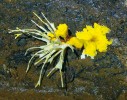Naše znalosti o ekologii a rozšíření řady druhů hub byly po dlouhou dobu založeny pouze na pozorování plodnic a sporulujících útvarů v terénu a na identifikaci izolovaných druhů hub. Nedávné pokroky a dostupnost metod založených na studiu DNA a jejich téměř rutinní používání v laboratořích rozšířilo naše znalosti o substrátech kolonizovaných různými druhy hub. Na druhou stranu se ukázalo, že některé druhy kolonizují stejný substrát, ale na geograficky velmi vzdálených lokalitách. Některé druhy ani nelze zařadit do jasně vymezené ekologické skupiny, mění svou ekologii v průběhu svého životního cyklu.
V článku použitá a citovaná literatura:
Grundy, K. C., Woodward, S., Genney, D. R., & Taylor, A. F. (2012). A molecular approach to explore the extent of the threatened fungus Hypocreopsis rhododendri within wood. Fungal Biol, 116(3), 354-362. doi: 10.1016/j.funbio.2011.12.002
Leuchtmann, Adrian, & Clémençon, Heinz. (2012). The taxonomic position of the genus Heydenia (Pyronemataceae, Pezizales) based on molecular and morphological data. Mycological Progress, 11(3), 699-710. doi: 10.1007/s11557-011-0779-5
Our information about the ecology and distribution of particular fungal species has for a long time been based only on observations of fruit bodies and sporulating structures in the field and on identification of isolated fungal strains. Recent developments in molecular methods and their routine use in mycology have revealed that some fungi may colonize different substrates than originally supposed. On the other hand, other fungi colonize their typical habitats in localities that are enormously distant from each other. Some fungi may not be easily assigned to a single ecological group, as they change various life styles during their life cycle.
 Tetraradiátní konidie (se čtyřmi rameny) neznámého druhu rodu Tripospermum (Ascomycota). Pátým ramenem byla konidie přichycena k myceliu. Foto O. Koukol
Tetraradiátní konidie (se čtyřmi rameny) neznámého druhu rodu Tripospermum (Ascomycota). Pátým ramenem byla konidie přichycena k myceliu. Foto O. Koukol











